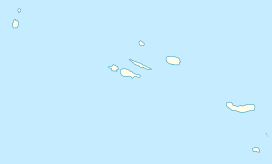Topo Volcano
Appearance
| Topo Volcano | |
|---|---|
 The volcano, seen northeast of Lajes do Pico | |
| Highest point | |
| Elevation | 1,002 m (3,287 ft) |
| Coordinates | 38°25′21″N 28°13′34″W / 38.42250°N 28.22611°W |
| Dimensions | |
| Area | 18 km3 (4.3 cu mi) (subaerial) |
| Volume | 8 km3 (1.9 cu mi) (subaerial) |
| Geography | |
| Country | |
| Geology | |
| Rock age | 300,000-10,000 years[1] |
| Mountain type | Shield volcano |
| Rock type | Ankaramite[2] |
| Last eruption | 5,000-10,000 years ago[3] |
Topo Volcano (Portuguese: Vulcão do Topo) is an inactive shield volcano located on Pico Island, Azores. The volcano measures 1,002 m (3,287 ft) in height and occupies the southernmost area of the island. It is part of the Lajes (or Topo) Volcanic Complex, the oldest volcanic apparatus which gave origin to the island, around 300,000 years ago. The volcano was created by a 600 m (2,000 ft) thick superposition of alternated Pāhoehoe lava flows and thin layers (10%) of pyroclastic material.[4][1][3][2]

Its land area is approximately 18 km2 (6.9 sq mi) but its total area, accounting for the sea floor and the area that gave rise to the Achada Plateau, is estimated to be around 120 km2 (46 sq mi).[3]
References
[edit]- ^ a b "Vulcão do Topo (Pico)". pt.artazores.com. Retrieved 15 June 2021.
- ^ a b "Enciclopédia Açoriana". Cultura Açores (in Portuguese). Retrieved 15 June 2021.
- ^ a b c Nunes, João C.; Lima, Eva A.; Fontiela, João (June 2006). "Caracterização geomorfológica e geológica da fajã lávica das Lages do Pico (Açores). Condicionantes e vulnerabilidades associadas". XII Expedição Científica do Departamento de Biologia. 34. Retrieved 15 June 2021.
- ^ Cruz, José V.; Silva, Manuel O. "Estudo do efeito de maré em aquíferos costeiros: O caso de estudo da ilha do Pico (Açores - Portugal)" (PDF). Retrieved 15 June 2021.



